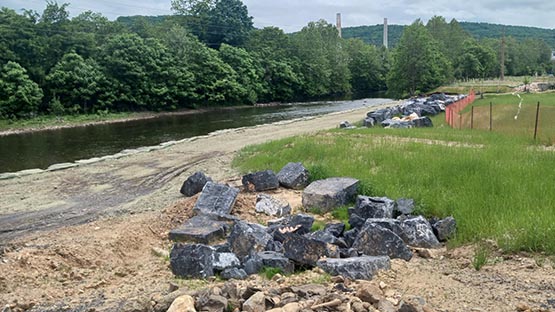
Speaking about the new record setting agricultural and forestry export figures, Governor McAuliffe stated, “Continuing to increase Virginia’s agricultural and forestry exports and making Virginia the East Coast capital for these exports are top economic development and job creation priorities for my administration. Agriculture and forestry, two of the state’s largest industries, play critical roles in maintaining our economic well-being, and the positive economic impact of these sectors is especially important to Virginia’s rural communities. Beyond that, new export sales can spur economic growth throughout the Commonwealth – from our world-class ports to our outstanding farms – and help us achieve important goals such as preserving more working farmland and attracting new business investments in agricultural processing and related industries.”
The Commonwealth previously reached a record level of agricultural exports in 2012, when more than $2.61 billion in products were shipped from Virginia ports into the global marketplace. In 2011, more than $2.35 billion in agricultural products were purchased by foreign customers. The 2011 figure was a six percent increase from 2010. Agricultural exports have grown in value by approximately 27 percent since 2010 when the Commonwealth launched a strategic plan to grow agricultural and forestry exports. Virginia’s agricultural exports are competitive in the global marketplace because of the high quality and diversity of products available for export and the Commonwealth’s excellent sea, air, and land port system. The growth in agricultural exports comes despite a continued slow economic recovery worldwide.
Governor McAuliffe’s strategic plan in agriculture and forestry for continuing to grow Virginia’s economy includes helping existing agribusinesses expand operations, recruiting new agribusinesses to Virginia, expanding international markets for Virginia products, and making strategic investments in rural infrastructure that support job growth in these areas. Nearly a quarter of all Virginians live in rural communities, meaning the health of Virginia’s entire economy is linked closely to the prosperity of agriculture and forestry. With more than thirty percent of gross farm income linked to exports, access to vibrant international markets is important to Virginia’s future economic prosperity.
“In spite of sharp decreases in prices for some of our key export products, increased volumes on strong demand and a pro-active and strategic trade marketing plan helped Virginia continue move more goods into the global marketplace,” said Todd Haymore, Virginia Secretary of Agriculture and Forestry. “Indeed, we now have the infrastructure in place to help Virginia companies find new opportunities overseas. Exporters can take advantage of Virginia’s network of trade representatives in key markets around the globe who have expertise in a variety of important market regions and countries. We have on-the-ground resources in Canada, Latin America, Europe, India, Russia, china and Hong Kong covering greater Southeast Asia. These representatives are there to work one-on-one with Virginia businesses looking to achieve new international sales.”
This year’s record amount of agricultural exports shipped from Virginia was driven by increased strong demand as the overall value of U.S. crops fell almost 10 percent in 2013. According to figures issued by the United States Department of Agriculture (USDA), farmers saw a decline in crop prices between 2012 to 2013 for major commodity crops such as corn and soybeans. The value of field crops fell to $166.95 billion in 2013, a significant decrease from $185.12 billion reported in 2012 according to USDA. Field crop harvests in 2012 were negatively impacted by a severe Midwestern drought, leading to record high prices for corn and soybeans in that year. In 2013, better nationwide growing conditions led to a record corn crop and third-largest soybean crop, which sent crop prices lower.
The top agricultural and forestry product exports from Virginia in 2013 included: soybeans, soy meal, and soybean oil; lumber and logs; unmanufactured leaf tobacco; wheat, corn, barley and other grains; animal feed; pork; poultry; seafood and other marine products; processed foods and beverages, including wine; wood pellets; animal fats and oils; raw peanuts; and cotton.
The top three export markets for Virginia in 2013 were China, Canada, both filling the same two spots in 2012, and Switzerland, which moved up from fourth in 2012. china imported more than $580 million in export agricultural purchases, while canada totaled just over $259 million. Switzerland imported more than $190 million in goods from Virginia in 2013. Virginia’s other top export markets, along with the values shipped rounded to the nearest million dollars include: Russia, $117 million; Indonesia, $110 million; Vietnam, $83 million; Saudi Arabia $80 million; Egypt, $79 million; Venezuela, $76 million; Taiwan $75 million; United Kingdom, $69 million; Poland, $56 million; Turkey, $48 million; Mexico, $45 million; Morocco, $45 million; Ireland, $44 million; Italy, $41 million; Netherlands, $40 million; Malaysia, $39 million; and Cuba, $38 million.
The Governor’s Conference on Agricultural Trade is co-hosted by the Virginia Farm Bureau Federation, Virginia Port Authority, Virginia Tech’s Department of Agricultural and Applied Economics, and the Virginia Department of Agriculture and Consumer Services. In addition to Governor McAuliffe and Secretary Haymore, the conference featured presentations from Amassador Kenichiro Sasae of Japan; Ambassador Nguyen Quoc Cuong of Vietnam; C. Larry Pope, President and Chief Executive officer of Smithfield Foods; Bob Stallman, President, American Farm Bureau Federation; Darci Vetter, Deputy Under Secretary of Agriculture for Farm & Foreign Agricultural Services; Giulio Menato, Agriculture Counselor for the European Union; Maria Eugenia de Sanchez, Coordinator of Traffic Forecasting, Panama Canal Authority; and several additional leading industry executives.
According to a 2013 economic impact study conducted by the University of Virginia’s Weldon Cooper Center for Public Service, agriculture and forestry are two of Virginia’s largest industries, with a combined economic impact of $70 billion annually. Agriculture generates more than $52 billion per annum, while forestry induces over $17 billion. The industries also provide more than 400,000 jobs in the Commonwealth.










